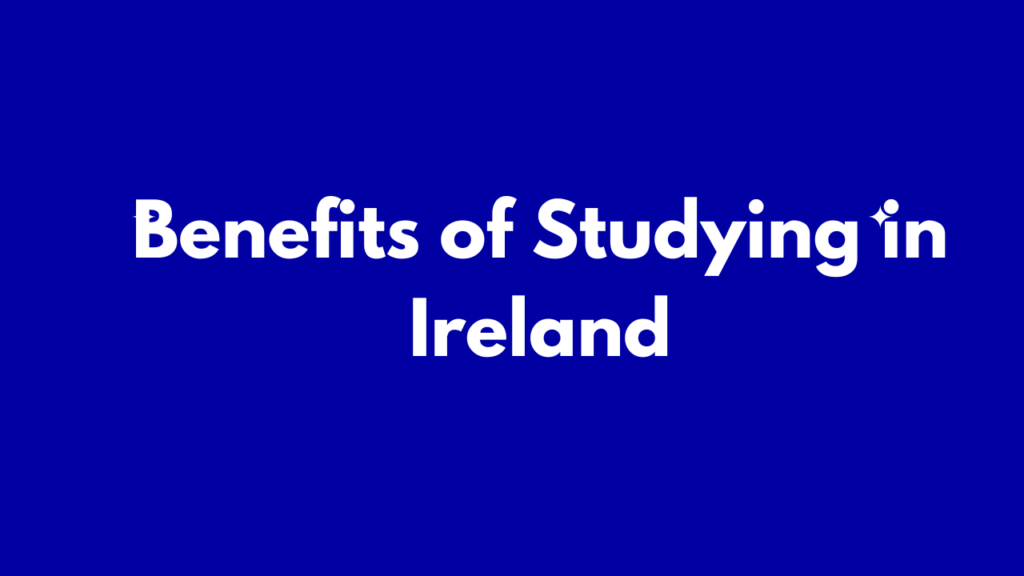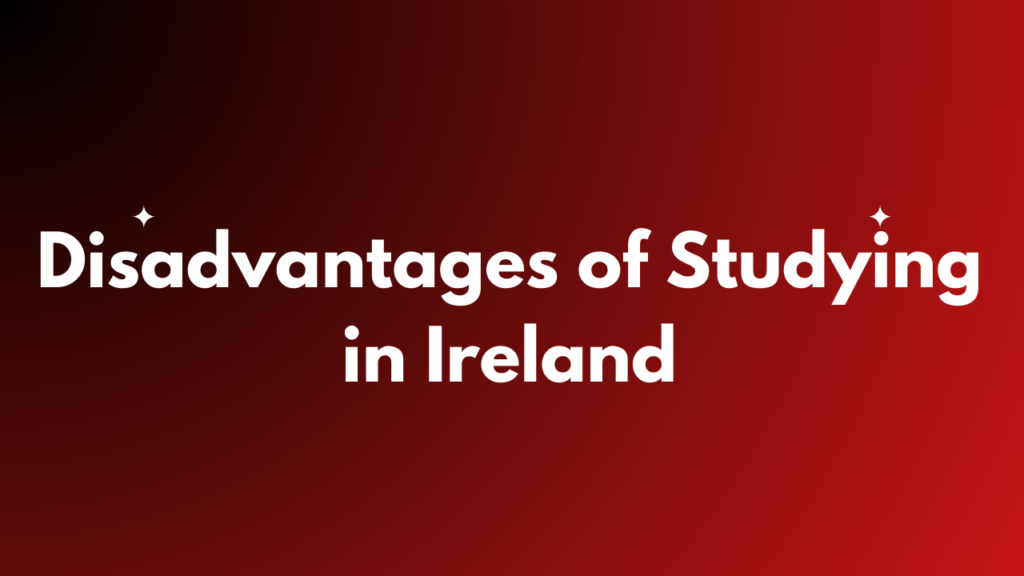Ireland has become a popular destination for students from around the world. With its top-ranking universities, friendly culture, and vibrant student life, many students consider Ireland a great place to pursue their education. However, like any country, studying in Ireland comes with both advantages and disadvantages.
In this article, we will explore the benefits and challenges of studying in Ireland to help you make an informed decision.
Here is a quick comparison of the benefits and disadvantages of studying in Ireland:
| Benefits | Disadvantages |
|---|---|
| High-quality education | High cost of living |
| English-speaking environment | Challenging weather |
| Post-study work opportunities | Competitive job market |
| Friendly and safe atmosphere | Visa and accommodation challenges |
| Rich cultural experience | Distance from home |
Benefits of Studying in Ireland

Studying in Ireland offers several advantages that attract international students. Let’s look at some key benefits.
1. High-Quality Education
Ireland is home to some of the world’s top universities and colleges, offering high academic standards.
Benefits:
- Globally recognized degrees
- Strong research opportunities
- Modern teaching methods
Top Universities in Ireland:
| University | World Ranking 2024 | Popular Courses |
|---|---|---|
| Trinity College Dublin | Top 100 | Business, Science, Arts |
| University College Dublin | Top 200 | Engineering, Medicine, Law |
| National University of Ireland, Galway | Top 250 | Humanities, IT, Healthcare |
| University of Limerick | Top 300 | Sports Science, Finance |
2. Wide Range of Courses
Ireland offers a variety of courses across different disciplines, making it easy for students to find programs that match their interests.
Popular Courses in Ireland:
- Business and Management
- Information Technology (IT)
- Engineering and Science
- Healthcare and Medicine
- Arts and Humanities
3. English-Speaking Country
Ireland is an English-speaking country, making it easier for students to adjust and communicate. This helps in academics, social life, and job opportunities.
Advantages:
- No language barrier for English speakers
- Easier communication with locals
- Improved English language skills for non-native speakers
4. Post-Study Work Opportunities
Ireland provides excellent opportunities for students to work after graduation.
Benefits:
- Stay-back visa options for international students (up to 2 years)
- Access to a growing job market in tech, finance, and healthcare
- Presence of multinational companies such as Google, Facebook, and Microsoft
5. Safe and Friendly Environment
Ireland is known for being a safe and welcoming country for international students.
Key Safety Features:
- Low crime rates
- Friendly and helpful locals
- Student support services in universities
6. Cultural Experience
Ireland has a rich history and culture, offering students a unique experience during their studies.
Things to Experience:
- Traditional Irish music and festivals
- Beautiful landscapes like the Cliffs of Moher and Ring of Kerry
- Rich literary heritage with authors like James Joyce and Oscar Wilde
7. Opportunities to Travel Around Europe
Ireland’s location makes it easy to explore other European countries.
Travel Advantages:
- Affordable flights to destinations like the UK, France, and Germany
- Part of the European Union (EU), allowing for travel without major restrictions
- Opportunity to experience different cultures and traditions
8. Scholarships for International Students
Ireland offers various scholarships to help students with tuition fees and living costs.
Popular Scholarships:
- Government of Ireland International Education Scholarships
- University-specific scholarships (e.g., UCD Global Excellence Scholarship)
- Erasmus+ program for EU students
Disadvantages of Studying in Ireland

While studying in Ireland has many benefits, there are also some challenges to consider.
1. High Cost of Living
Living expenses in Ireland, especially in cities like Dublin, can be expensive.
Average Monthly Expenses:
| Expense | Estimated Cost (EUR) |
|---|---|
| Accommodation | €800 – €1,500 |
| Food | €250 – €400 |
| Transportation | €50 – €100 |
| Miscellaneous | €100 – €200 |
Ways to Reduce Costs:
- Look for shared accommodations
- Use public transport discount cards
- Cook meals at home instead of eating out
2. Weather Conditions
Ireland has a cool and rainy climate, which may not be suitable for everyone.
Common Weather Issues:
- Frequent rain throughout the year
- Cold winters and short daylight hours
- May take time to adjust for students from warmer countries
3. Limited Course Availability in Some Fields
While Ireland offers many courses, some specialized fields may have limited options compared to other countries.
Examples:
- Niche subjects like certain arts and design programs
- Advanced research facilities in specialized fields may be limited
4. Competitive Job Market
Although Ireland offers good job opportunities, competition can be tough, especially in popular fields.
Challenges:
- High demand for certain job roles
- Work permit restrictions for non-EU students
- Importance of networking to secure jobs
5. Complex Visa Process
The student visa process for Ireland can be time-consuming and require detailed documentation.
Requirements:
- Proof of acceptance from an Irish university
- Financial statements showing funds for tuition and living costs
- English language proficiency test (IELTS, TOEFL)
6. Distance from Home
For students coming from far-away countries, being away from home for a long time can be challenging.
Common Issues:
- Homesickness
- Expensive flights to visit home
- Cultural adjustments
7. Accommodation Challenges
Finding affordable and suitable accommodation in major cities can be difficult due to high demand.
Possible Solutions:
- Start searching early
- Consider university housing options
- Look for accommodation in suburban areas for lower rent
FAQ
1. Is Ireland a good place for international students?
Yes, Ireland is a great destination for international students due to its high-quality education, friendly environment, and opportunities for post-graduation work. The country also offers a rich cultural experience and numerous scholarships for students.
2. What are the requirements to study in Ireland?
To study in Ireland, you typically need:
- A letter of acceptance from an Irish university
- Proof of English proficiency (IELTS, TOEFL)
- Proof of financial support
- Valid student visa (for non-EU students)
- Health insurance
3. How much does it cost to study in Ireland?
The cost of studying in Ireland varies depending on the university and course. On average:
- Tuition fees: €10,000 – €35,000 per year
- Living expenses: €10,000 – €15,000 per year (including accommodation, food, and transportation)
4. Can I work while studying in Ireland?
Yes, international students can work part-time while studying. You are allowed to work:
- Up to 20 hours per week during the academic year
- Up to 40 hours per week during holidays
5. Is there a stay-back option after graduation in Ireland?
Yes, Ireland offers a stay-back option under the Third Level Graduate Scheme:
- Up to 2 years for master’s graduates
- Up to 1 year for bachelor’s graduates
This allows students to seek employment and apply for a work permit later.
6. Which are the best cities in Ireland for students?
Some of the best cities for students in Ireland include:
- Dublin: Home to top universities and a vibrant student life
- Cork: A lively city with excellent educational institutions
- Galway: Known for its cultural events and student-friendly atmosphere
- Limerick: Offers affordable living and quality education
7. Do I need health insurance to study in Ireland?
Yes, all international students must have health insurance before arriving in Ireland. EU students can use the European Health Insurance Card (EHIC), while non-EU students need private health insurance.
8. What are the common challenges faced by international students in Ireland?
Some challenges include:
- Adapting to the rainy weather
- High cost of living, especially in Dublin
- Finding affordable accommodation
- Homesickness and cultural adjustment
9. Are scholarships available for international students in Ireland?
Yes, various scholarships are available, including:
- Government of Ireland International Education Scholarships
- University-specific scholarships (e.g., UCD Global Excellence)
- Research-based scholarships for postgraduate students
10. How can I find accommodation in Ireland as a student?
Students can find accommodation through:
- University-provided student housing
- Private rented apartments
- Homestays with Irish families
- Websites such as Daft.ie and Rent.ie
11. What are the most popular courses for international students in Ireland?
Some of the most sought-after courses include:
- Business and Management
- Computer Science and IT
- Engineering and Science
- Healthcare and Nursing
- Arts and Humanities
12. What is the weather like in Ireland for students?
Ireland has a mild, rainy climate with:
- Cool summers (average 15-20°C)
- Mild winters (average 5-10°C)
- Frequent rain throughout the year
13. Is it easy to travel within Ireland as a student?
Yes, Ireland has good transportation options including:
- Buses (Dublin Bus, Bus Éireann)
- Trains (Irish Rail)
- Affordable student travel cards (Leap Card)
14. What are the career opportunities after studying in Ireland?
Ireland has a growing job market, especially in sectors like:
- Information Technology (IT)
- Finance and Accounting
- Pharmaceuticals
- Engineering
Many multinational companies, such as Google, Apple, and Facebook, have offices in Ireland.
15. How early should I apply for a student visa for Ireland?
It is recommended to apply for a student visa at least 3 months before your course starts to avoid delays.
Conclusion
Studying in Ireland comes with many benefits, such as high-quality education, post-study work opportunities, and cultural experiences. However, students should also be aware of challenges like high living costs, unpredictable weather, and competitive job markets.
If you’re considering studying in Ireland, make sure to weigh both the pros and cons to decide if it’s the right choice for you.

Hi, I’m Tanvir, the founder and author of Explore Ireland Now. With a deep love for Ireland and its rich culture, history, and landscapes, I created this site to share everything that makes this beautiful country worth exploring. Whether you’re a local looking for hidden gems or a traveler planning your next adventure, I provide insightful guides, tips, and recommendations to help you experience Ireland to the fullest.
From stunning landscapes to vibrant cities and quaint villages, Ireland is full of wonders waiting to be discovered. Through my personal experiences and research, I aim to bring you the most up-to-date information and inspiration for your journey.
Thank you for visiting Explore Ireland Now—I hope my content helps you uncover all that this incredible country has to offer! If you have any questions or need travel advice, feel free to reach out.



